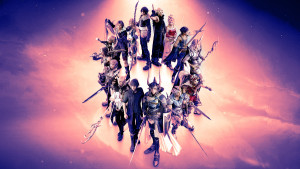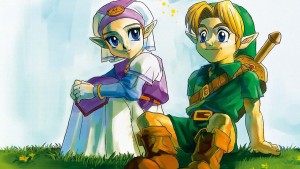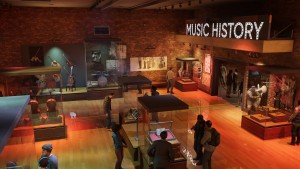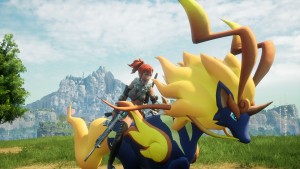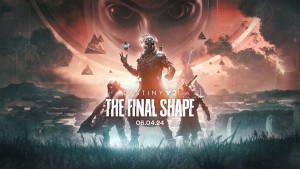Grand Kingdom Review

The strategy/RPG genre has seen its share of growing pains in this modern age, and plenty of games have tried to shake things up, such as Fire Emblem's relationship system and The Banner Saga's choice-driven narrative. Grand Kingdom is paving its own way, ditching grid-based combat, offering a bevy of customization, and putting more action into the combat. It does a wonderful job, and I enjoyed the challenging battles, building up my party, and competing online.
The game has a single-player campaign that serves as your introduction to the title and all its intricacies. This is a hefty time investment and worth engaging in to build up your party. The plot is basic, mainly about how the continent of Resonail, which is made up of four nations, has erupted into war. The lure to Grand Kingdom isn't its story, however, it's the gameplay and party-building, and the campaign delivers on those fronts, giving you fun missions and battles.
In Grand Kingdom, you put together a team of four mercenaries with classes of your choosing. Every time you step into a mission or quest, it's set up like a board game, where you move your piece around the field. This can trigger battles or random events, but treasure and resources are also planted across the field. You have a set amount of steps you can take with each map before it's game over, but the allotment is generous. The board is littered with obstacles, and depending on your party selection, certain field skills can help you get around them. For instance, I had a wind skill that could take away any bad weather instantly, which normally would take three turns to clear up.
Journeying the board to find the optimal path has its own interesting dilemmas, but the battle system is also stellar. In combat, you have three lanes where your party and enemies can be moved. Character placement can mean life or death; you usually want your tanks up front and your ranged members in the back, but you also have to make decisions in the heat of battle, such as getting them out of the way if they're vulnerable to a canon or a charged attack. You can see the turn order and what's incoming to help you strategize. Deciding which enemies to attack first can be make or break. Do you want to focus on deadly mages right in your vicinity or are you better off eliminating the leader to lower the opponent's morale, affecting their action and move gauge?
Encounters are a cross between turn-based and action gameplay, forming one of my favorite strategy/RPG battle systems of recent years. Every character has an action gauge for movement and attacks. For melee characters, you want to repeatedly press the corresponding button to combo up attacks when near enemies. For ranged characters, it's all about timing and hitting the attack button as a meter displays on the enemy. In both cases, characters can knock opponents in the air or hit them into objects (or even each other) for more damage. Using the environment to your advantage is fun, and I like the skill involved in how you execute your attacks. Battles have surprising variety in how they play out, and there's nothing like lining up an attack and having it kill multiple enemies as they fly into each other. But also beware of your own characters' positions, because they can take friendly damage. Sometimes it might mean letting a party member get severely wounded for the greater good.
Outside of taking on missions, some of the most fun I had was building up my party with the breadth of customization the game offers. The class variety is diverse, featuring everything from a dragon mage to an arcanist, and you choose their skills, allocating experience points, and equipping them with gear you can buy or create. As a cool feature, all the gear you equip shows up visibly on your party, so you can put everything from clown noses to mummy wraps on them.
I loved all the options to consider for my characters. You have four main attacks, plus passive skills and support skills. How this continues to expand as you level up is exciting, since your team earns skills, but you can also purchase some, such as healing and poison resistance. A lot of the skills are appealing and can be game-changers, so you're constantly making tough choices of what skill you can live without.
While the battle system thrives, the backdrops, especially in combat, do nothing to help it. I noticed the scenery was similar in every encounter, making them lack excitement. Maps can also take a while to complete, and in the campaign you sometimes have three boss battles in succession. Dying at the end of the map can mean losing a lot of progress. No save points exist during the maps, which makes sense because you can back yourself into a corner with the resource management, but these game overs are frustrating nonetheless.
The experience also gets repetitive in other ways. In and outside of the campaign, you're grinding to improve your party at every turn, though you do have different types of quests to negate some of the tedium. Your level carries over when you take your party online, where you form a contract with one of the four nations vying for domination. You can pick a specific number of wars to support, and depending on your choices, shops and trade posts of rival nations won't be available to you. However, you do get access to perks in these areas from your nation. Wars play out daily, and you can choose to manually control your troops or let the A.I. control your party. I did both. When I went to bed at night, I set the A.I. control, so I'd wake up with extra experience, items, and gold in the morning. Other times, I wanted to see how I stacked up to the competition and manually controlled my party for battles, which was exciting because I saw opponents use strategies I never considered. You can also level up your party by taking on quests against the computer with specific objectives, such as making deliveries or defending areas. You can even just explore an area with no objective to find treasure and gather resources for crafting.
Despite all these options, my engagement drastically declined after a few days of playing faithfully. Even if the conditions are slightly different, you're still doing the same thing: battles on repeat and roaming similar maps. Plus, even when I supported a nation, I felt like a drop in the bucket; my efforts did not have much influence in its success or failure, so playing against others lost its allure after a while. The rewards online are also disappointing; while you get items and money, nothing I received was grand enough to keep me coming back.
Grand Kingdom is a solid strategy/RPG, especially if you've been hankering for something new and different. I am interested to see where the series goes in the future. It feels like it has a solid foundation, and I'd love to see that expanded with even more reasons to stick around after you polish off the campaign and play some online matches. Even so, the game is entertaining, and strategy fans should appreciate all the decisions it puts in their hands.

